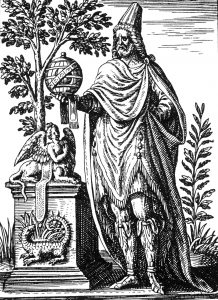Members-only podcast episode
Græme Miles Apollonicates Further

This is a special podcast episode for SHWEP members only
Already a member? Log in here to view this episode
 In this extended interview we discuss a number of interesting aspects of Apollonius’ life and Philostratus’ take on said life.
In this extended interview we discuss a number of interesting aspects of Apollonius’ life and Philostratus’ take on said life.
There is the question of Damis, Apollonius’ right-hand-man, who, Philosotratus tells us, wrote a book about his master on which Philostratus has based his own account. But did Damis even exist? We discuss the literary trope of the ‘found document’ which never existed. (Lovers of esotericism will find many examples coming to mind here from recent esoteric history, from the ‘Egyptian Tablets’ of Joseph Smith to the Theosophical ‘Mahatma Letters’ to the ‘Cypher Manuscript’ of the Golden Dawn. It turns out this trope goes back to antiquity). In the case of Philostratus and his audience, was the Book of Damis even mean to be accepted as historical reality?
Then there is the question of interpretation, esoteric and otherwise, which is hugely significant but also problematic in the case of Philostratus, because he actually puts interpretive theory into the mouth of Apollonius, inviting his readers to reflect on the act of interpreting the Life of Apollonius itself. The question of the ‘authorial fallacy’ rears its head (again: see Episode 26), and Miles suggests, against an easy consensus which sometimes exists in scholarship on antiquity, that Philostratus and his contemporary sophists were in fact well aware that readers (and viewers of art, etc.) construct the meanings they find in what they read.
We then discuss some of the fascinating afterlife of the figure of Apollonius: master-sage, magician, pagan answer to Christ, French fin-de-siècle hipster, and much more, and follow the trail of the logos into the East Roman Middle Ages, where Michæl Psellos makes an appearance.
Works Discussed in this Episode:
Primary:
- Dictys of Crete and Dares of Phrygia wrote ‘eyewitness accounts’ of the Trojan war. The sole English translation of their works seems to be The Trojan War. The Chronicles of Dictys of Crete and Dares the Phrygian. Translated by R. M. Frazer (Jr.). Indiana University Press, 1966.
- Eusebius: contra Hieroclem, in which the Christian father refutes a lost work by a traditionally-religious opponent of Christianiy who had held up Apollonius of Tyana as the traditional answer to Jesus.
- Philostratus: there is a very good new Loeb of the Heroicus and Gymnasticus, along with what the editors (Jeffrey Rusten and Jason König) call the two dialexeis. For the Letters the Loeb of Philostratus, Aelian and Alciphron (letters of each) is still the current one, though it’s pretty old. For the Lives of the Sophists it’s still Wilmer Cave Wright’s Loeb, in English. Watch his space for a new Loeb edition by Græme Miles and Han Baltussen, due out in 2021.
- Porphyry claims that Apollonius is better than Christ: The comparison of Jesus’ miracles with those of Apollonius (and Moses and Apuleius) is Against the Christians fr.4 = Jerome, Homily on Psalm 81 (PL 26,1130). In the Testimonia which C.P. Jones collects in the most recent Loeb of the VA and associated works it is Testimonium 33 (Volume 3 of this Loeb). This article is a good place to check out the whole Apollonius vs Jesus dynamic in late antiquity: Elsner, Jas’. ‘Beyond Compare: Pagan Saint and Christian God in Late Antiquity’. Critical Inquiry 35, Spring 2009.
- Psellos on allegory: Opusculum 44 in Michaelis Pselli Philosophica Minora, vol.1. Opuscula logica, physica, allegorica, alia (ed. J.M. Duffy), Teubner, 1992.
Secondary:
-

Follower of Pieter Bruegel the Elder, The Temptation of Saint Anthony, c. 1550/1575, oil on panel, Samuel H. Kress Collection 1952.2.19 Flaubert, Gustave: For an edition of Flaubert’s novel in English, you could do worse than this star-studded volume: The Temptation of Saint Anthony. (New York: Random House, 1992). Michel Foucault (introduction), Lafcadio Hearn (translation), and Marshall Olds (glossary).
- Moréas, Jean: ‘Your hands are stretched as though for theurgy …’. Ses mains qu’elle tend comme pour des théurgies pp.13-14 in Les cantilénes.

Comments
Comments are open to SHWEP members only
Join now to comment
Already a member? Log in here